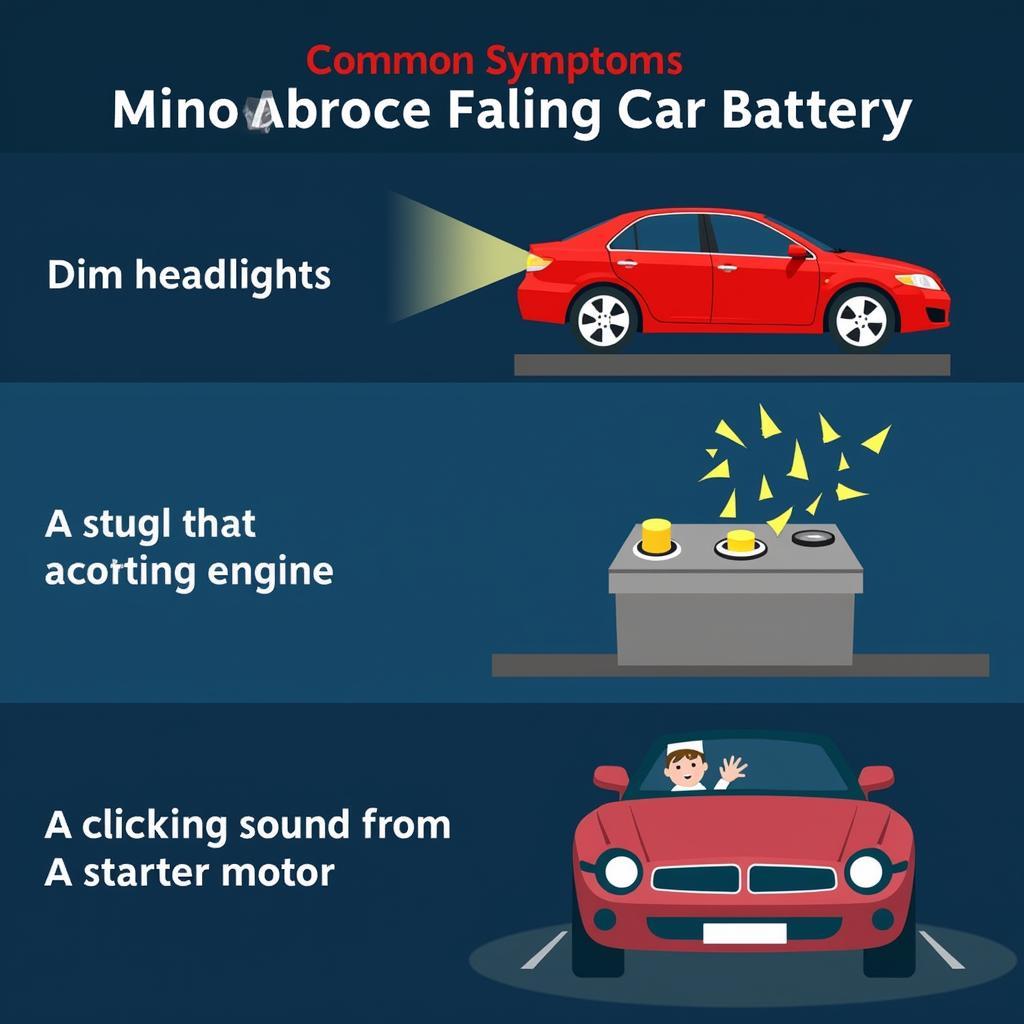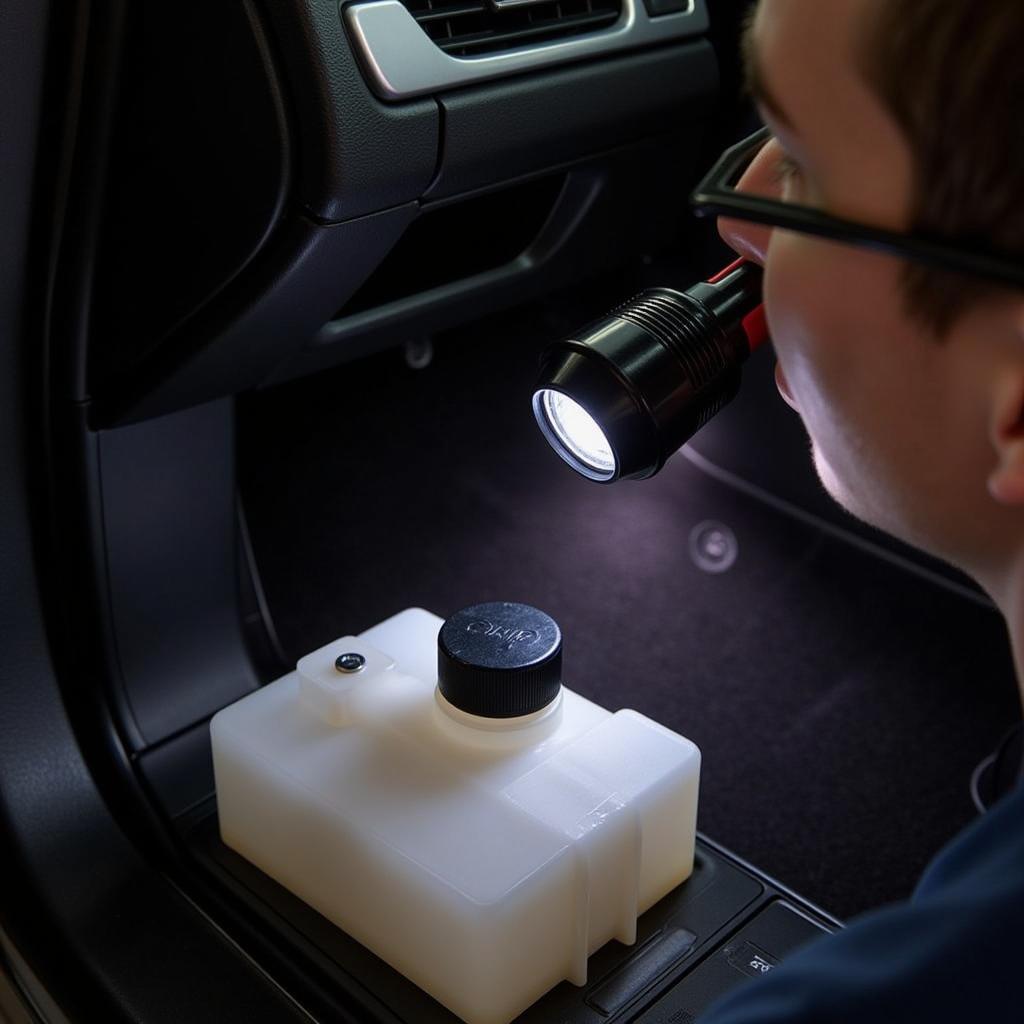A dead car battery can be a major inconvenience, leaving you stranded and frustrated. Recognizing the signs that your car battery is bad can save you from unexpected trouble and allow you to address the issue proactively. This article will delve into the common indicators of a failing car battery, providing you with the knowledge you need to keep your vehicle running smoothly.
Common Signs Your Car Battery is Failing
There are several telltale signs that your car battery is nearing the end of its life. Being aware of these can help you avoid a breakdown.
- Slow Engine Crank: One of the most obvious signs of a weak battery is a slow engine crank. If your engine takes longer than usual to turn over or makes a sluggish groaning sound, your battery may be struggling to provide enough power.
- Dim Headlights: A failing battery may not be able to power your vehicle’s electrical systems effectively. Dim headlights, especially when the engine is idling, can indicate a low battery charge.
- Clicking Sound When Turning the Key: If you hear a rapid clicking sound when you turn the key in the ignition but the engine doesn’t start, it’s a strong sign of a dead or dying battery. This clicking is the sound of the starter motor trying to engage but lacking the necessary power.
- Electrical Issues: A bad battery can affect various electrical components in your car. You might notice issues with the power windows, radio, interior lights, or other accessories.
- Dashboard Warning Light: Many modern vehicles have a battery warning light on the dashboard. If this light illuminates, it’s a clear indication that there’s a problem with your charging system, which could be related to the battery itself.
- Swollen Battery Case: Excessive heat can cause the battery case to swell or bulge. If you notice any deformation in the battery case, it’s crucial to replace it immediately, as it poses a safety hazard.
- Old Age: Car batteries typically last between three and five years. If your battery is approaching or exceeding this age, it’s a good idea to have it tested and consider replacing it as a preventative measure.
 Bad Car Battery Symptoms: Slow crank, dim lights, clicking sounds
Bad Car Battery Symptoms: Slow crank, dim lights, clicking sounds
How to Test Your Car Battery
Testing your car battery is a straightforward process. You can use a multimeter or a battery tester to check its voltage.
- Gather your tools: You’ll need a multimeter or a battery tester.
- Turn off the ignition: Ensure the engine is off and all accessories are turned off.
- Connect the tester: Connect the positive (red) lead of the tester to the positive terminal of the battery and the negative (black) lead to the negative terminal.
- Check the reading: A fully charged battery should read around 12.6 volts. A reading below 12.4 volts indicates a low charge, and a reading below 12 volts usually means the battery needs to be replaced.
What Causes a Car Battery to Go Bad?
Several factors can contribute to a car battery’s demise.
- Extreme Temperatures: Both extreme heat and cold can shorten a battery’s lifespan. Hot weather can cause the battery fluid to evaporate, while cold temperatures can thicken the fluid and reduce its effectiveness.
- Short Trips: Short trips don’t give the alternator enough time to fully recharge the battery, leading to a gradual depletion of charge over time.
- Parasitic Drain: Even when the car is off, certain electrical components can continue to draw power from the battery, slowly draining it. This is known as a parasitic drain and can be caused by faulty wiring or malfunctioning accessories.
- Old Age: As batteries age, their internal components degrade, reducing their ability to hold a charge.
Conclusion
Knowing the signs that your car battery is bad can help you avoid the inconvenience and potential danger of a breakdown. By regularly inspecting your battery, performing simple tests, and addressing any underlying issues, you can ensure reliable starting power and extend the life of your car battery. Don’t wait for your battery to completely fail before taking action. Proactive maintenance is key to keeping your vehicle on the road.
FAQ
- How long do car batteries typically last? Car batteries usually last between three and five years, depending on usage and environmental conditions.
- Can I jump-start a car with a completely dead battery? While jump-starting can sometimes temporarily revive a dead battery, it’s often a sign that the battery needs to be replaced.
- How much does a new car battery cost? The cost of a new car battery varies depending on the type and size, but you can typically expect to pay between $50 and $200.
- Can I replace my car battery myself? Yes, replacing a car battery is a relatively simple task that many people can do themselves with basic tools.
- How can I prevent my car battery from going bad? Regularly cleaning the battery terminals, limiting short trips, and addressing any parasitic drains can help prolong the life of your battery.
- What should I do with my old car battery? Most auto parts stores and recycling centers accept old car batteries for proper disposal.
- Is it safe to drive with a bad car battery? Driving with a bad battery can be unreliable and potentially dangerous, as it can lead to a breakdown or electrical system failures.


